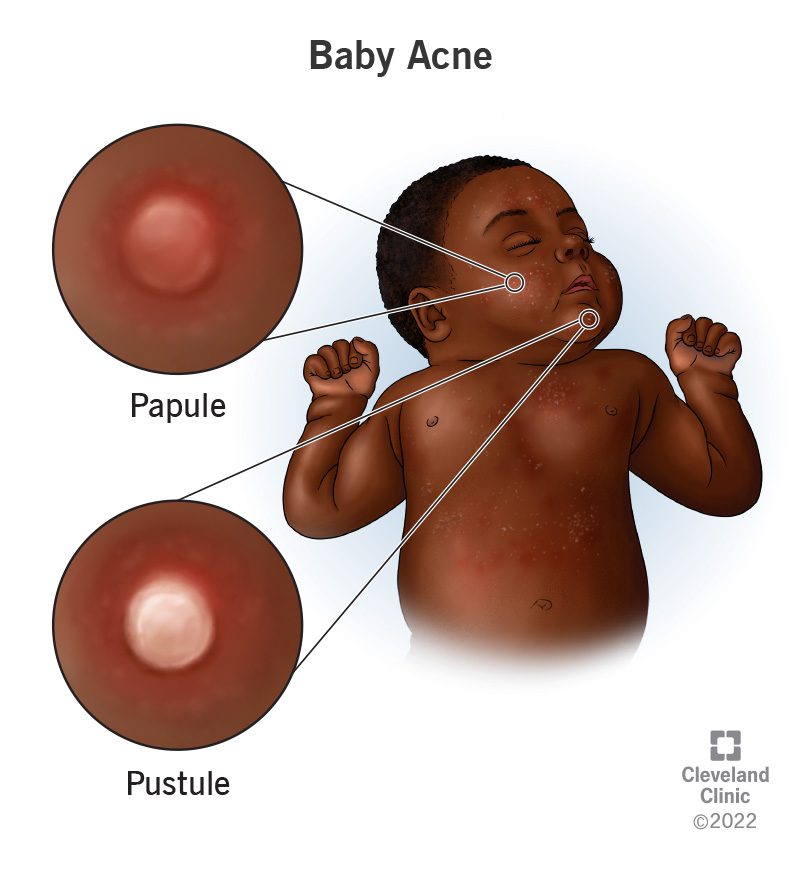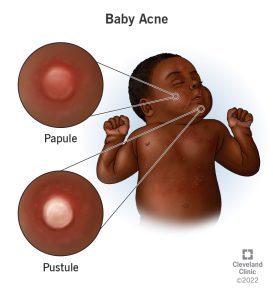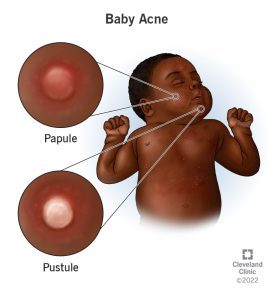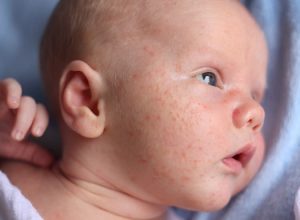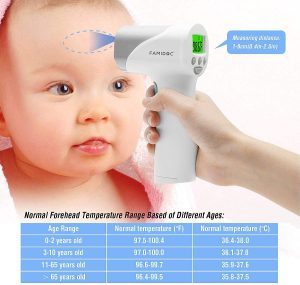Baby acne self-care involves gently cleansing the affected area with mild soap and water, avoiding harsh products and excessive scrubbing. Baby acne is a common condition that affects newborns and infants.
It is characterized by small red bumps or whiteheads on the baby’s face, particularly on the cheeks, chin, and forehead. Although it may be concerning for parents, baby acne is typically harmless and tends to resolve on its own within a few months.
When it comes to caring for baby acne, it is important to handle the affected area gently. Using mild soap and water, parents can gently cleanse the baby’s face, taking care not to scrub vigorously. It is crucial to avoid using harsh products or over washing the skin, as this can aggravate the condition. Furthermore, it is recommended to dress the baby in soft, breathable fabrics and avoid covering their face with synthetic materials. It is also advised to avoid applying lotions or creams to the affected area, as they can clog pores and worsen the acne. By following these simple self-care measures, parents can help alleviate baby acne and promote healthy skin for their little ones.
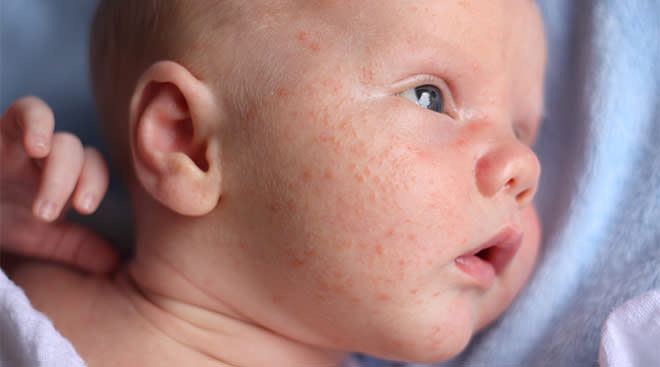
Understanding Baby Acne, acne self-care
Baby acne is a common skin condition that affects many infants shortly after birth. As a parent, it can be concerning to see your little one’s delicate skin covered in small red bumps or whiteheads. However, it’s essential to know that baby acne is temporary and typically harmless. In this article, we will explore common causes of baby acne and discuss how it differs from regular acne.
Common Causes Of Baby Acne, Baby acne can occur due to various factors, some of which are:
- Hormonal Changes: During pregnancy, a mother’s hormones cross the placenta and stimulate the oil glands in the baby’s skin. This hormonal transfer can lead to the development of acne.
- Irritation: Certain fabrics, detergents, or skincare products can irritate a baby’s sensitive skin, triggering acne-like symptoms.
- Bacterial Overgrowth: Sometimes, an excess of certain bacteria on the skin can contribute to the development of baby acne.
While these causes may be unsettling, it’s crucial to remember that baby acne is a natural occurrence and will usually resolve on its own without any treatment. However, there are a few self-care practices you can adopt to manage and soothe your baby’s skin.
Difference Between Baby Acne And Regular Acne
Baby acne is not the same as the acne experienced by teenagers or adults. Here are key differences to help you identify baby acne:
| Characteristic | Baby Acne | Regular Acne |
|---|---|---|
| Age of Onset | Usually appears in the first few weeks after birth. | Typically emerges during puberty. |
| Location | Primarily affects the face, especially the cheeks and forehead. | Can occur on the face, chest, back, and other body parts. |
| Appearance | Red bumps, whiteheads, or pustules. | Blackheads, whiteheads, pimples, or cysts. |
| Duration | Tends to fade away within a few weeks or months. | May persist for several years if left untreated. |
| Discomfort | Usually does not cause any discomfort or itching. | Can be painful, itchy, or sensitive. |
By understanding the differences between baby acne and regular acne, you can gain clarity on your baby’s condition and provide appropriate care.
Baby acne is a common occurrence that usually resolves on its own. While it may be tempting to apply creams or ointments, it’s generally best to avoid using any harsh products on your baby’s delicate skin. Instead, focus on maintaining proper hygiene and practicing gentle self-care techniques to help soothe their skin and promote healing.
Identifying Baby Acne
Baby acne is a common skin condition that affects many infants in their first few months of life. Identifying baby acne can help parents take appropriate steps to care for their baby’s delicate skin. Knowing the typical symptoms and when to consult a pediatrician is key to managing baby acne effectively.
Typical Symptoms To Look For
When identifying baby acne, look for small red or white bumps on your baby’s face, particularly on the cheeks, nose, and forehead. The acne may resemble tiny pimples and can appear similar to an adult’s acne outbreak. Stay vigilant for the appearance of these bumps as they can be an indication of baby acne.
When To Consult A Pediatrician
If your baby’s acne persists beyond six months of age or becomes severely inflamed, consult a pediatrician for advice. Additionally, if the acne spreads to other areas of the body or appears to cause discomfort or irritation to the baby, seeking professional guidance is crucial. Ensuring your baby’s health is of utmost importance, so do not hesitate to reach out to a healthcare provider if you have concerns about your baby’s baby acne.
Gentle Care Practices
When it comes to caring for baby acne, implementing gentle care practices is crucial. Baby acne requires a delicate approach to avoid aggravating the condition. By focusing on gentle care practices, you can help alleviate discomfort and support your baby’s delicate skin.
Choosing The Right Skincare Products
It’s essential to choose skincare products specifically formulated for baby skin. Look for fragrance-free and hypoallergenic options, as these are less likely to cause irritation. Opt for gentle cleansers and non-comedogenic moisturizers to keep your baby’s skin clean and well-moisturized.
Developing A Daily Skincare Routine
Establishing a daily skincare routine can help manage baby acne effectively. Use a soft washcloth or cotton pad dampened with warm water to gently cleanse the affected areas. Avoid using harsh soaps or exfoliants. Pat the skin dry with a soft towel and apply a thin layer of baby-specific moisturizer. Consistency is key in maintaining healthy skin and managing baby acne.
Home Remedies For Baby Acne
If your baby is experiencing baby acne, don’t fret! There are several natural remedies that you can try at home to help alleviate this common condition. In this section, we’ll discuss some effective natural remedies as well as precautions you should take when using them.
Natural Remedies To Try
When it comes to treating baby acne, it’s always best to start with gentle, natural remedies. Here are a few options that can help soothe your baby’s skin:
- Warm water cleanse: Gently clean your baby’s face with lukewarm water and a soft cloth. Avoid using harsh soaps or chemicals that can irritate the skin.
- Breast milk: Believe it or not, breast milk has natural antibacterial properties that can help with baby acne. Simply apply a few drops of breast milk on the affected areas using a clean cotton pad.
- Coconut oil: Coconut oil has moisturizing and anti-inflammatory properties that can help reduce redness and irritation. Apply a thin layer of organic coconut oil to your baby’s face after cleansing.
- Oatmeal bath: An oatmeal bath can soothe irritated and inflamed skin. Grind oats into a fine powder and add it to warm bathwater. Gently bathe your baby in this mixture for a few minutes and then rinse with clean water.
- Chamomile tea compress: Chamomile tea has calming and anti-inflammatory effects. Brew a cup of chamomile tea, let it cool, and dip a clean cloth in the tea. Gently dab the affected areas with the tea-soaked cloth.
Precautions To Take When Using Home Remedies
While home remedies can be effective in treating baby acne, it’s important to take certain precautions to ensure your baby’s safety:
- Consult your pediatrician: Before trying any home remedies, it’s always a good idea to consult your pediatrician. They can provide guidance specific to your baby’s needs.
- Patch test: Before applying any remedy to your baby’s face, do a small patch test on their arm or leg to check for any adverse reactions.
- Gentle application: Always use gentle and light pressure when applying any remedy to your baby’s face. Avoid scrubbing or rubbing vigorously, as it can further irritate the skin.
- Keep it clean: Ensure that all tools and ingredients you use are clean and sterile. This will help minimize the risk of infection.
- Monitor for reactions: Keep a close eye on your baby’s skin after applying any remedy. If you notice any worsening of the acne or signs of an allergic reaction, stop using the remedy and consult a healthcare professional.
Preventing Baby Acne Flare-ups
Keeping baby’s skin clean is crucial in preventing acne flare-ups. Follow these simple tips to maintain a healthy skin care routine for your little one.
Tips For Keeping Baby’s Skin Clean
- Use a mild, fragrance-free baby cleanser to wash your baby’s face daily.
- Gently pat the skin dry to avoid irritation.
Avoiding Common Triggers
- Avoid using harsh soaps or lotions on your baby’s delicate skin.
- Avoid excessive rubbing or scrubbing during bath time.
Effects Of Baby Acne On Parents
Parents often feel overwhelmed by the effects of baby acne on their little one. Seeing red bumps on their baby’s delicate skin can lead to stress and worry.
Managing Parental Stress And Concerns
To manage parental stress, take time for self-care activities. Deep breaths and gentle skincare routines can help you feel calmer.
Seeking Support From Healthcare Providers
If you are concerned about baby acne, consult your healthcare provider for guidance. They can offer reassurance and treatment options.
When To Seek Medical Help
If your baby’s acne doesn’t seem to be improving or if you notice any concerning signs, it’s important to consult a healthcare professional. While baby acne is usually harmless and tends to resolve on its own, there are certain situations where medical attention may be necessary to ensure your baby’s health and well-being.
Signs That Baby Acne Might Be Severe
If you observe any of the following signs, it is recommended to reach out to your pediatrician:
- Persistent Redness: If the affected areas of your baby’s skin become increasingly red and inflamed, it could be a sign of more severe acne.
- Pus-filled Lesions: If your baby’s acne develops pus-filled lesions or appears infected, it’s important to seek medical attention as it may require treatment.
- Fever or Irritability: If your baby develops an unexplained fever or seems unusually irritable, it may indicate an underlying issue that needs medical evaluation.
- Spreading or Worsening: If the acne continues to spread or worsen, even after practicing self-care measures, it’s advisable to consult a healthcare professional for further guidance.
Treatment Options Available From Professionals
If your baby’s acne is severe or causing significant discomfort, your pediatrician or dermatologist may recommend the following treatment options:
- Topical Creams or Ointments: In some cases, your healthcare professional may prescribe a topical medication to reduce inflammation and promote healing of the affected skin.
- Antibiotics: If there are signs of infection, your doctor may prescribe antibiotics to tackle the underlying bacterial cause of the acne.
- Laser Therapy: For severe cases of baby acne, laser therapy may be used to target and reduce redness and inflammation.
- Professional Guidance and Support: Seeking medical help will provide you with expert advice and reassurance, helping you navigate any concerns or questions you may have about your baby’s acne.
Remember, while baby acne can be distressing to see on your little one’s delicate skin, it is typically a temporary condition that resolves as your baby grows. Keeping an eye out for any severe signs and seeking medical assistance when necessary will help ensure your baby’s skin remains healthy and beautiful.
Embracing Your Baby’s Skin
Baby acne is a common skin condition affecting many infants, and as a parent, it’s essential to embrace your baby’s skin and promote self-care. By understanding the significance of loving your baby’s unique features and promoting their self-confidence, you can play a crucial role in nurturing their self-esteem right from the start.
Promoting Self-confidence In Your Baby
Encourage your baby to embrace their natural skin by ensuring they feel loved and cherished. Avoid scrutiny or negative comments about their appearance, instead, focus on their overall well-being. Instilling confidence in your baby from an early age can lead to a positive self-image in the future.
Importance Of Loving Your Baby’s Unique Features
Embracing your baby’s unique features shows them that they are beautiful just the way they are. Promote a culture of diversity and inclusion within your household, letting your baby know that their individuality is something to be celebrated.

What Helps Baby Acne Go Away?
Gently cleansing the affected area with water and mild baby soap can help baby acne go away. Avoid using harsh chemicals or scrubbing the acne.
What Triggers Baby Acne?
Baby acne is typically triggered by maternal hormones passed to the baby, stimulating oil glands. It is a common, temporary condition affecting newborns.
Should I Put Breast Milk On Baby Acne?
Yes, it is safe to put breast milk on baby acne. The antibodies in breast milk can help clear up the acne. Just dab a little breast milk on the affected area and let it air dry. Repeat a few times a day until the acne improves.
Is It Best To Leave Baby Acne Alone?
Yes, it’s best to leave baby acne alone. Gently clean your baby’s face. Avoid using harsh products. Let the acne resolve on its own. If it continues or worsens, consult a pediatrician.
Conclusion
Consistently gentle and simple care is key for managing baby acne. Remember to keep the affected areas clean with mild soap and water, avoiding any harsh scrubbing or chemicals. Additionally, maintaining a clean environment and choosing breathable fabrics for your baby’s clothes can also help prevent irritation.
It’s important to understand that baby acne is a common and temporary condition that usually resolves on its own. If you have any concerns or your baby’s acne worsens, consult a healthcare professional for advice. ” baby acne self-care, baby acne self-care “

